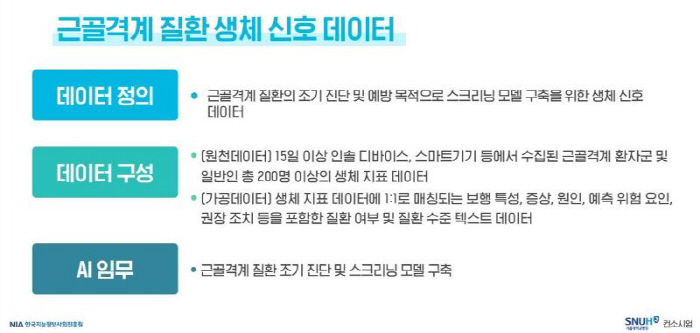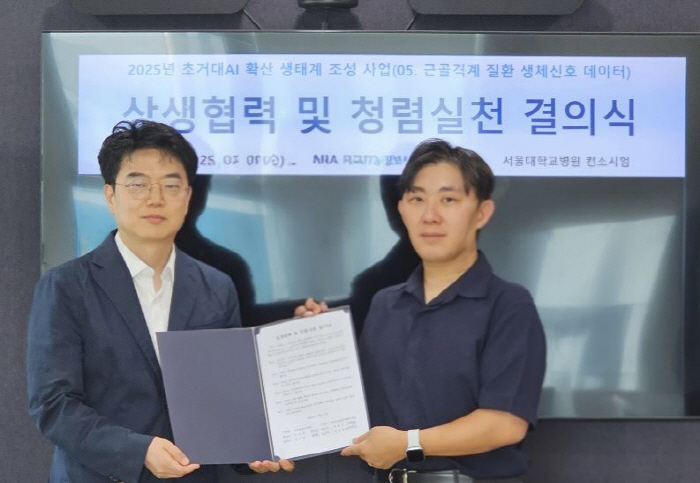Seoul National University Hospital launched a project to create an ultra-large AI proliferation ecosystem...The first attempt to build a musculoskeletal disease dataset
|
This project is part of the 「Early 2025 AI Spread Ecosystem Creation Project」 and will be promoted by the Ministry of Science and ICT and the Korea Intelligence Information Society Promotion Agency (hereinafter referred to as 'NIA"). Among them, the Seoul National University Hospital consortium was selected as the final implementation organization for the 「Musculoskeletal Disease Bio-signal Data Construction Project」 in the field of beauty and health.
PCN Co., Ltd. and All Big Det Co., Ltd. will participate in the consortium organized by Professor Cho Min-woo's team in the Department of Convergence Medicine at Seoul National University Hospital, and the support budget is KRW 580 million. In addition, Professor Jeong Jae-woo's team at Yonsei University's Sports Science and Exercise Medicine Center, Gil-on Co., and Top Medical Co., Ltd. will join as partners.
The launch report meeting was held with the NIA at the Institute of Convergence Medicine and Technology at Seoul National University Hospital on the 9th to announce the start of the project in earnest. At the meeting, the Seoul National University Hospital consortium emphasized the importance of building vertical AI data necessary to advance low-cost and high-efficiency performance by preoccupying specialized and specialized areas centered on areas with strengths at the national level. In particular, with musculoskeletal diseases such as degenerative arthritis rapidly increasing in an aging society, the importance of establishing high-quality walking biosignal data for early diagnosis and prediction-based management of diseases is being emphasized.
This project is a task to collect walking patterns and biosignal data from degenerative arthritis patients and the general public through sensors and build an AI learning dataset that can diagnose and screen diseases early. It will run for six months from July 1, 2025.
The project is carried out through data collection, refining, construction, and inspection. A total of 200 people with degenerative arthritis and the general public wear smart sols (I-SOLs) to collect gait data and go through a refining process to remove errors. After that, IMU sensors and walking mats are used to measure quantitative indicators in clinical settings, and based on this, the Seoul National University Hospital consortium produces high-quality AI learning data and finally inspects it. The constructed data will be pre-processed and labeled for AI learning and then opened through AI Hub.
This project is expected to secure large-scale and long-term data based on real life outside of hospitals to improve the accuracy of diagnosis and lay the foundation for developing digital treatment devices and prognosis prediction solutions.
Professor Cho Min-woo (Department of Convergence Medicine) of Seoul National University Hospital said, "This project is of great significance in that it uses real-life walking data to build high-quality quantitative biosignals and links them to artificial intelligence learning data. It will be an important starting point for overcoming the limitations of early diagnosis and establishing a predictable musculoskeletal disease management system based on AI."," he stressed.
|
This article was translated by Naver AI translator.





